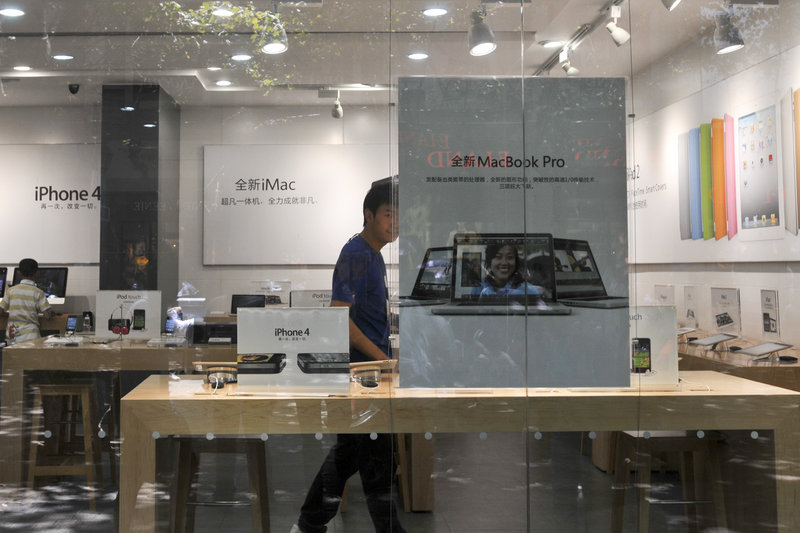BEIJING – It looks almost exactly like a sleek Apple store. Sales assistants in blue T-shirts with the company’s logo chat with customers. Signs advertising the iPad 2 hang on the white walls. Outside, the famous logo sits next to the words “Apple Store” – one of the few clues that the whole thing is a fake.
China, long known for producing counterfeit consumer gadgets, software and brand name clothing, has reached a new piracy milestone: fake Apple stores.
An American who lives in Kunming in southern Yunnan province said Thursday that she and her husband stumbled on three shops masquerading as bona fide Apple stores in the city a few days ago. She took photos and posted them on her BirdAbroad blog.
The 27-year-old blogger, who spoke on condition of anonymity, said the setup of the stores was so convincing that the employees themselves seemed to believe they worked for Apple.
“It had the classic Apple store winding staircase and weird upstairs sitting area. The employees were even wearing those blue T-shirts with the chunky Apple name tags around their necks,” she wrote on her blog.
“But some things were just not right: the stairs were poorly made. The walls hadn’t been painted properly. Apple never writes ‘Apple Store’ on its signs — it just puts up the glowing, iconic fruit.”
A worker at the fake Apple store on Zhengyi Road in Kunming, which most of the photos of the BirdAbroad blog show, told The Associated Press that they are an “Apple store” before hanging up.
But the three stores are not among the authorized resellers listed on Apple Inc.’s website. The maker of the iPhone and other hit gadgets has four company stores in China — two in Beijing and two in Shanghai — and various official resellers.
Amy Bessette, a spokeswoman for the Cupertino, Calif.-based company, said it had no comment on the Chinese stores but pointed to a Web page on Apple’s Chinese site that lists its authorized resellers.
The manager of an authorized reseller in Kunming, who gave only his surname, Zhang, said most customers have no idea the stores are fake. Some of the staff in the stores “can’t even operate computers properly or tell you all the functions of the mobile phone,” he said.
The proliferation of the fake stores underlines the slow progress that China’s government is making in countering a culture of rampant piracy and widespread production of bogus goods that is a major irritant in relations with trading partners.
China’s Commerce Minister promised American executives earlier this year that the latest of several crackdowns on product piracy would deliver lasting results.
China’s official Xinhua News Agency reported this month that police arrested more than 9,000 suspects in a nine-month anti-piracy campaign as it shut down more than 12,000 factories that produced counterfeit goods.
Apple said this week that China was “very key” to its record earnings and revenue in the quarter that ended in June.
The company plans to open two more Apple stores in greater China – one in Shanghai and another in Hong Kong – by the end of the year.
Piracy is especially sensitive at a time when Washington and other Western governments are trying to create jobs by boosting exports.
Copy the Story Link
Send questions/comments to the editors.



Success. Please wait for the page to reload. If the page does not reload within 5 seconds, please refresh the page.
Enter your email and password to access comments.
Hi, to comment on stories you must . This profile is in addition to your subscription and website login.
Already have a commenting profile? .
Invalid username/password.
Please check your email to confirm and complete your registration.
Only subscribers are eligible to post comments. Please subscribe or login first for digital access. Here’s why.
Use the form below to reset your password. When you've submitted your account email, we will send an email with a reset code.